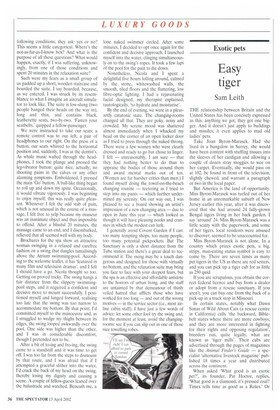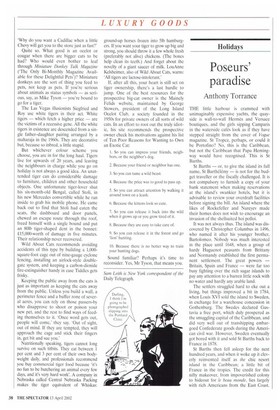Easy tiger
Sam Leith
THE relationship between Britain and the United States has been concisely expressed as this: anything we got, they got one bigger. And it doesn't just apply to buildings and missiles; it even applies to mad old ladies' pets.
Take Joan Byron-Marasek. Had she lived in a bungalow in Surrey, she would have been content with stuffing tissues into the sleeves of her cardigan and allowing a couple of dozen stray moggies to wee on her carpet. Eventually, she would pass on at 102, be found in front of the television, slightly chewed, and warrant a paragraph or two in the local paper.
But America is the land of opportunity. Miss Byron-Marasek was turfed out of her home in an unremarkable suburb of New Jersey earlier this year, after it was discovered that she had around 24 fully-grown Bengal tigers living in her back garden. I say 'around' 24. Miss Byron-Marasek was a little scatty with the paperwork, and some of her tigers, local residents were amused to discover, seemed to be unaccounted for.
Miss Byron-Marasek is not alone, In a country which prizes exotic pets, a big, stripy, man-eating status symbol is easy to come by. There are seven times as many pet tigers in the US as there are red setters, and you can pick up a tiger cub for as little as 250 quid.
If you are scrupulous, you obtain the correct federal licence and buy from a dealer or adopt from a rescue sanctuary. If you aren't, you can buy one from the back of a pick-up in a truck stop in Missouri.
In certain states, notably what Dawn Simas of Wild About Cats (a rescue centre in California) calls 'the backward, Biblebelt states where there are more cowboys, and they are more interested in fighting for their rights and opposing regulation', breeders run, quite legally, what are known as 'tiger mills'. Their cubs are advertised through the pages of magazines like the Animal Finder's Guide — a specialist 'alternative livestock magazine' published 18 times a year and distributed across the continent.
When asked 'What good is an exotic pet?', its founder, Pat Hoctor, replies, 'What good is a diamond, it's pressed coal? Timex tells time as good as a Rolex.' Or 'Why do you want a Cadillac when a little Chevy will get you to the store just as fast?'
Quite so. What good is an ocelot or cougar when there are bigger cats to be had? Who would even bother to leaf through Miniature Donkey Talk Magazine (`The Only Bi-Monthly Magazine Available for these Delightful Pets')? Miniature donkeys are the sort of thing you feed to pets, not keep as pets. If you're serious about animals as status symbols — as serious, say, as Mike Tyson — you're bound to go for a tiger.
The Las Vegas illusionists Siegfried and Roy use white tigers in their act. White tigers — which fetch a higher price — are the victims of a recessive gene. All the white tigers in existence are descended from a single father–daughter pairing arranged by a maharaja in the 1960s. They are decorative but, because so inbred, a little stupid.
But whichever colour scheme you choose, you are in for the long haul. Tigers live for upwards of 20 years, and leaving the neighbours in charge while you go on holiday is not always a good idea. An unattended tiger can do considerable damage to furniture, children and other household objects. One unfortunate tiger-lover shut his six-month-old Bengal, called Stoli, in his new Mercedes convertible while he ran inside to grab his mobile phone. He came back out to find that Stoli had eaten the seats, the dashboard and door panels, chewed an escape route through the roof, freed himself with a single bound and put an 801b tiger-shaped dent in the bonnet: £15,000-worth of damage in five minutes. Their relationship never recovered.
Wild About Cats recommends avoiding accidents of this type by building a 1,000square-foot cage out of nine-gauge cyclone fencing, installing an airlock-style doublegate system, and keeping a carbon-dioxide fire-extinguisher handy in case Tiddles gets frisky.
Keeping the public away from the cats is just as important as keeping the cats away from the public. Unless you build a wall, a perimeter fence and a buffer zone of several acres, you can rely on those passers-by who disapprove to shoot or poison your new pet, and the rest to find ways of feeding themselves to it. 'Once word gets out, people will come,' they say. 'Out of sight, out of mind. If they are tempted, they will approach the cage and stick their fingers in, get bit and sue you.'
Nutritionally speaking, tigers cannot long survive on such titbits. They eat between 1 per cent and 3 per cent of their own bodyweight daily, and professionals recommend you buy commercial tiger food because 'it's no fun to be butchering an animal every few days, and it's very hard work'. A company in Nebraska called Central Nebraska Packing makes the tiger equivalent of Whiskas: ground-up horses frozen into 5lb hamburgers. If you want your tiger to grow up big and strong, you should throw it a few whole fresh (preferably not alive) chickens. (The bones help clean its teeth.) And forget about the novelty of a giant saucer of milk. LouAnne Kelsheimer, also of Wild About Cats, warns: 'All tigers are lactose-intolerant.'
If, after all this, your heart is still set on tiger ownership, there's a last hurdle to jump. One of the best resources for the prospective big-cat owner is the Mainely Felids website, maintained by George Stowers, president of the Long Island Ocelot Club, a society founded in the 1950s for private owners of all sorts of wild cats. In an effort to root out the truly idiotic, his site recommends the prospective owner check his motivations against his list of Ten Poor Reasons for Wanting to Own an Exotic Cat:
1. So you can impress your friends, neighbors, or the neighbor's dog.
2. Because your friend or neighbor has one.
3. So you can tame a wild beast.
4. Because the price was to good to pass up.
5. So you can attract attention by walking it around town on a leash.
6. Because the kittens look so cute.
7. So you can release it back into the wild when it grows up or you grow tired of it.
8. Because they are easy to take care of.
9. So you can release it in the forest and go 'lion' hunting.
10. Because there is no better way to train your hunting dogs.
Sound familiar? Perhaps it's time to reconsider. Yes, Mr Tyson, that means you.
Sam Leith is New York correspondent of the Daily Telegraph.



















































































 Previous page
Previous page